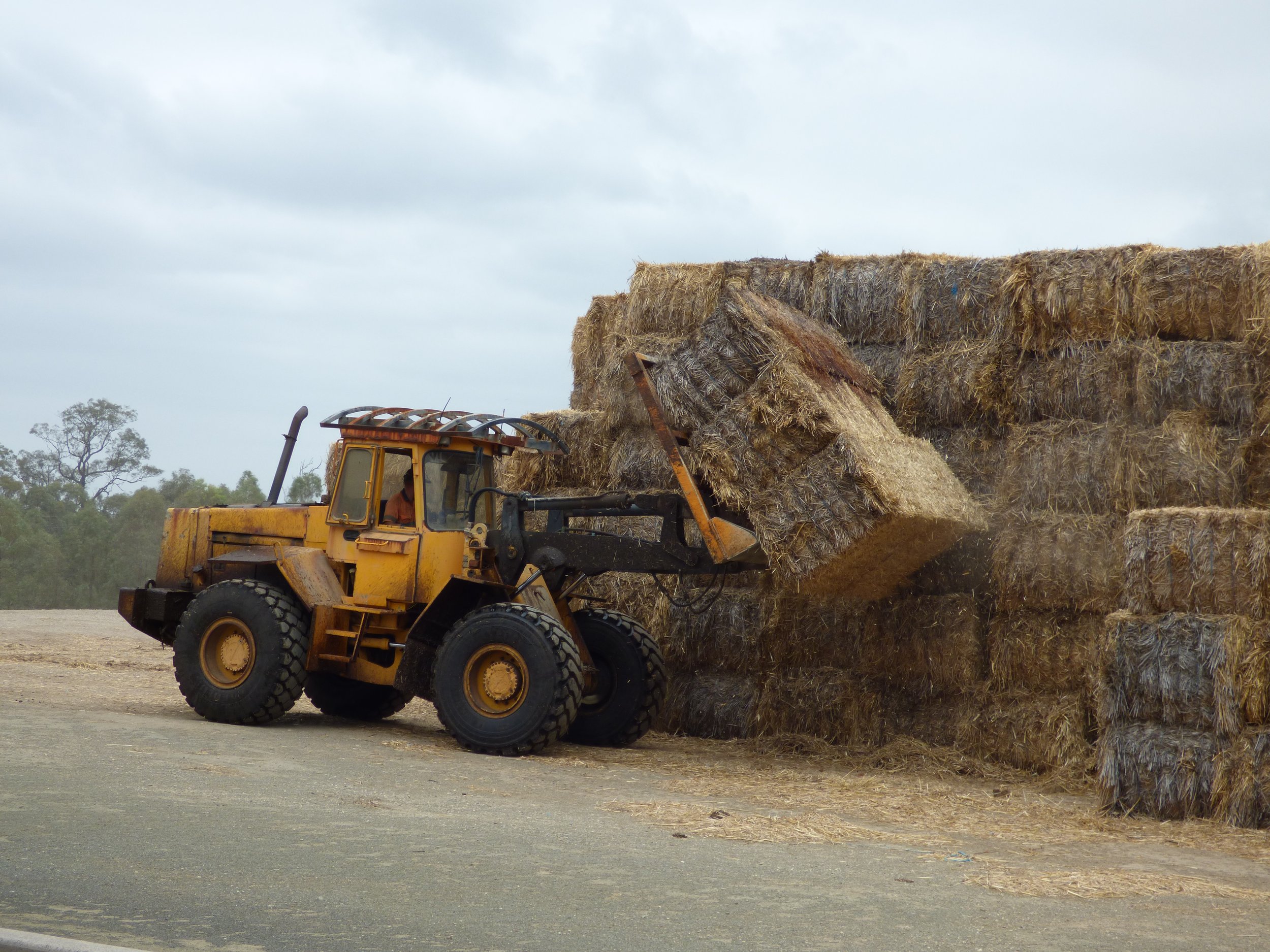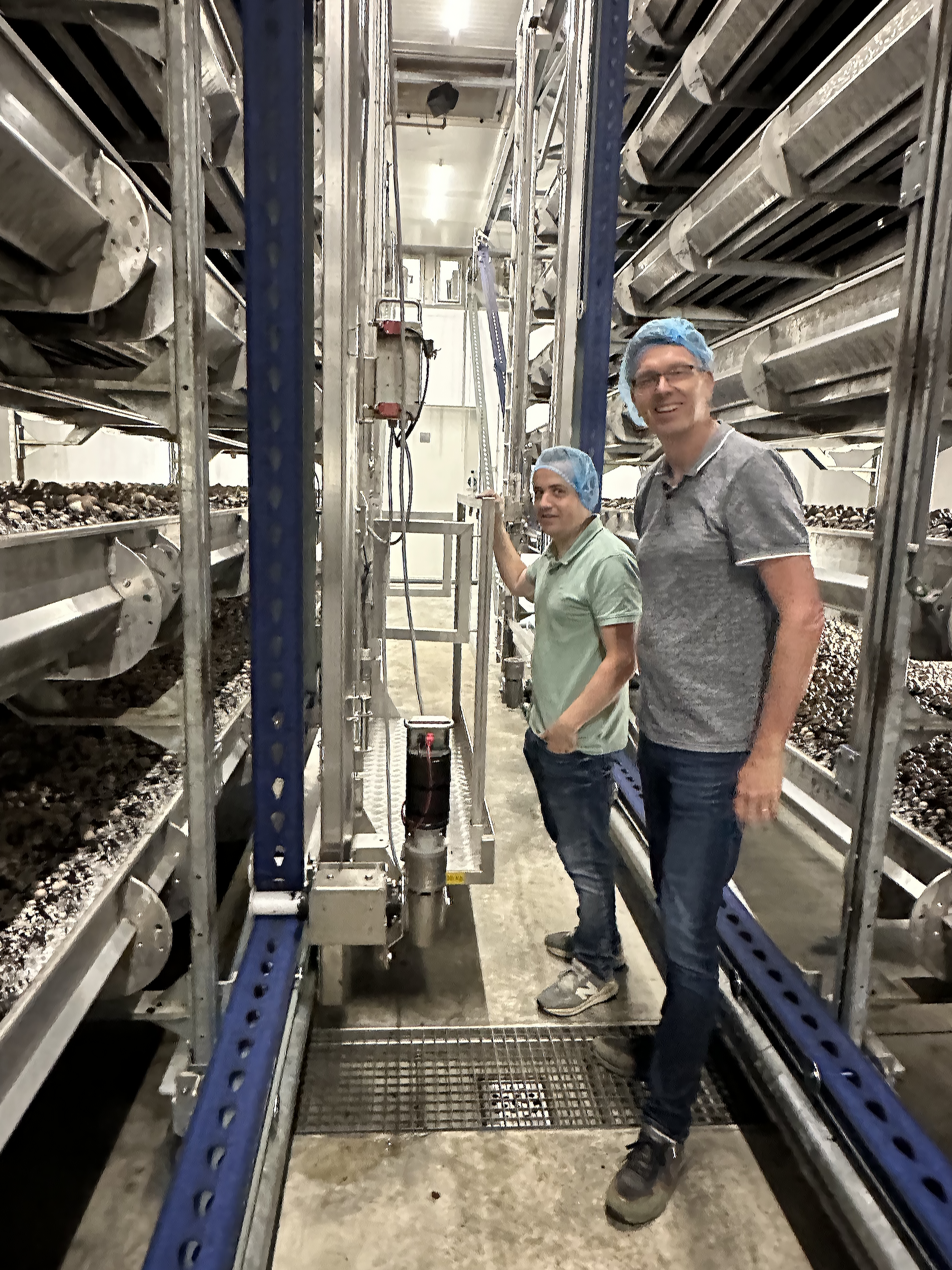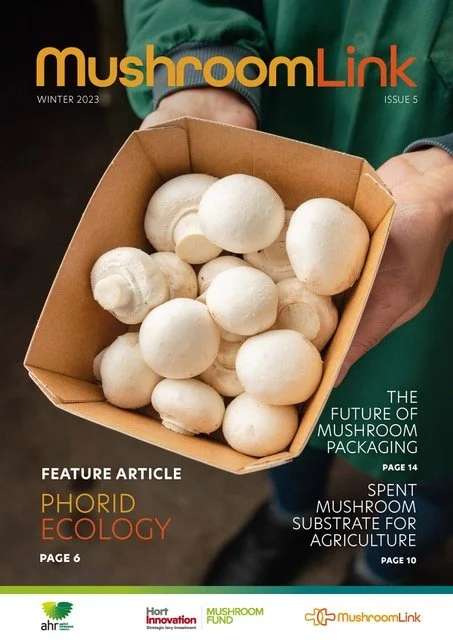Testing the effects of nitrogen
Project MU17004 (Optimising nitrogen transformations in mushroom production), led by Professor Michael Kertesz at the University of Sydney, aims to understand the influence of soil microbes on nitrogen transformations occurring in compost and casing during mushroom production. The objective of this ongoing project is to optimise nitrogen management, reducing losses from compost and improving yield and quality.
Project MU17004 (Optimising nitrogen transformations in mushroom production), led by Professor Michael Kertesz at the University of Sydney, aims to understand the influence of soil microbes on nitrogen transformations occurring in compost and casing during mushroom production. The objective of this ongoing project is to optimise nitrogen management, reducing losses from compost and improving yield and quality.
Bringing mushrooms from the shadows to centre stage in the Australian Dietary Guidelines
In the world of nutrition, even the most mundane details can have a profound impact on our health and wellbeing. Enter the Australian Dietary Guidelines (ADG) - a comprehensive blueprint designed by the
Australian Government to steer us towards better dietary choices.
In the world of nutrition, even the most mundane details can have a profound impact on our health and wellbeing. Enter the Australian Dietary Guidelines (ADG) - a comprehensive blueprint designed by the Australian Government to steer us towards better dietary choices.
Balancing air and moisture within compost
What is the academic/technical knowledge around ventilation within the compost matrix during cropping and its effect on mycelium growth and mushroom yield? We know through experience that the 'right' structure and density of the compost in the growing containers is important, but we have no measures or even consistent data about the goals we are aiming for.
What is the academic/technical knowledge around ventilation within the compost matrix during cropping and its effect on mycelium growth and mushroom yield? We know through experience that the 'right' structure and density of the compost in the growing containers is important, but we have no measures or even consistent data about the goals we are aiming for.
Monaghan Mushrooms
Monaghan Mushrooms is one of the largest mushroom-only companies in the world. Started by Ronnie Wilson in the early 1980s, it has grown to a company of more than 3,000 staff, with composting yards and growing facilities in Ireland, the UK and Canada. Like many mushroom businesses, Monaghan Mushrooms is facing the dual challenge of increasing productivity while also improving sustainability. To achieve this, the company invests strongly in Research and Development (R&D), and are heavily invested in the search for an alternative to peat.
Monaghan Mushrooms is one of the largest mushroom-only companies in the world. Started by Ronnie Wilson in the early 1980s, it has grown to a company of more than 3,000 staff, with composting yards and growing facilities in Ireland, the UK and Canada. Like many mushroom businesses, Monaghan Mushrooms is facing the dual challenge of increasing productivity while also improving sustainability. To achieve this, the company invests strongly in Research and Development (R&D), and are heavily invested in the search for an alternative to peat.
My pesticide doesn’t work!
When applied correctly, pesticides are a very effective component of a mushroom farm’s IPDM (Integrated Pest and Disease Management) strategy, rapidly reducing pest and pathogen populations. When a pesticide seems no longer to work, or appears to work less effectively than before, it is very concerning. The purchase of pesticides is a significant expense for mushroom farms particularly when faced with increasing costs across the board. It is important from an economic perspective that pesticide effectiveness is optimised and that growers see a good return on their investment.
When applied correctly, pesticides are a very effective component of a mushroom farm’s IPDM (Integrated Pest and Disease Management) strategy, rapidly reducing pest and pathogen populations. When a pesticide seems no longer to work, or appears to work less effectively than before, it is very concerning. The purchase of pesticides is a significant expense for mushroom farms particularly when faced with increasing costs across the board. It is important from an economic perspective that pesticide effectiveness is optimised and that growers see a good return on their investment.
Increasing the efficiency of picking and packing with GTL technology
GTL Europe’s tilting shelf harvesting system is designed to improve the efficiency of picking by allowing pickers to see the bed and use both hands to harvest mushrooms. It also takes trimming and packing out of the growing room. The system has now been refined further, with new tools soon coming online for both brand new growing rooms and those wanting to retrofit an existing farm.
MushroomLink has written previously about GTL Europe’s tilting shelf harvesting system. The system is designed to improve the efficiency of picking by allowing pickers to see the bed and use both hands to harvest mushrooms. It also takes trimming and packing out of the growing room. The system has now been refined further, with new tools soon coming online for both brand new growing rooms and those wanting to retrofit an existing farm.
MushroomLink Bulletin September 2023
In this edition:
Feature: Can mushrooms really help lower our cholesterol?
Event wrap: Mushroom production workshop
Mushroom Fund Annual Investment Plans 2023/24
Podcast: Global perspectives from Erik de Groot
Podcast: Geoff Price and the American mushroom industry - part two
Resource: MU16003 Fact sheet: Internal Stipe Necrosis
Upcoming webinar
Shape the future of the mushroom industry - EOIs
Horticulture women leadership courses, scholarships open
Project MU22010 – Mushroom International Study Tours – Inbound and Outbound
Part of the in- and outbound International Study Tours project, the inaugural Mushroom Production workshop, facilitated by Erik de Groot, was held in Adelaide and Sydney at the end of August
Figure 1: Robert Tolson at Premier Mushrooms explaining the room-filling procedure and machinery on his farm (Umberto Calvo)
US-based international consultant and mushroom expert Erik de Groot delivered the 2-day workshops to industry members eager to learn.
Elbows deep in compost and mushrooms since his childhood in the Netherlands, Erik’s knowledge and experience range from compost production to harvesting and everything in between, with clients spread across five continents.
With the aim to educate and inspire the Australian mushroom industry and promote collaborative problem solving, attendees were asked to work together in small groups. Participants were split into these groups depending on their role (compost production, growing, harvesting) to encourage conversation within their areas of expertise and generate new ideas and solutions to current issues.
The first day of the workshop focussed on compost production, phase II and III compost, tunnel and growing room filling, and the optimal conditions of the various stages (temperature, humidity, ventilation). The attendees involved in compost production were the most active throughout the first day, while growers and harvest managers were able to better understand the dynamics of the phases that precede their entry into the crop cycle.
Figure 2: Attendees were invited to "have a feel" of good quality peat with adequate moisture (Umberto Calvo)
Day 1 also included a farm visit to Costa Monarto in South Australia and Premier Mushrooms in the Hawkesbury, with the farm staff showing the facilities, machinery, and explaining the various steps of their mushroom production and management.
The second day was centred on growing and harvesting practises to optimise yield and quality, with a particular focus on harvest efficiency and planning.
At the end of the session each group had to elaborate on the actions they were planning on taking back to their farm with the newly acquired knowledge from the workshop.
The event was very well received by all attendees, both thanks to the broad scope of themes and the opportunity to expand their network vertically with people from their own farm and peers across different farms.
The opportunity to network with colleagues from different parts of one’s own workplace was viewed as an important outcome. Communication and collaboration throughout every step of the process, from compost production to growing and harvesting, can have a big impact on the overall result, and ultimately determine the farm’s and farmer’s bottom line.
At the end of the two-day workshop the participants were asked to complete an evaluation and suggestion form, which will assist AMGA as it plans the next events. Attention will be placed on the topics and issues identified by the Australian mushroom industry as the most relevant right now.
Additional resources
Mushroom international study tours – inbound and outbound (MU22010)
Key research provider: Australian Mushroom Growers’ Association
What's it all about?
This project delivers a range of inbound and outbound international study tours for the mushroom industry. Through these activities, the Australian mushroom industry will increase their knowledge of global innovations and develop stronger networks with international peers and researchers.
The project team will organise outbound study opportunities for industry personnel, particularly emerging leaders, to attend international conferences and educational farm tours while strengthening the existing connections with international mushroom organisations.
International topic experts or innovators will also be invited to visit Australia to conduct educational workshops and present at domestic industry events.
A balanced advisory panel will choose the successful applicants, who will receive a partially funded scholarship to participate in the outbound study tours. More information will be made available through MushroomLink and AMGA communications.
Recipients will be required to showcase key learnings within the mushroom industry communications program, and mushroom industry conference, for knowledge and information transfer to the broader industry.
Associated resources
Global perspectives from Erik de Groot
Image courtesy of the AMGA 2023
Erik de Groot - Consultant Mushroom Business
Following his recent trip to Australia, where he delivered training workshops to local growers, Erik de Groot took some time to chat with MushroomLink’s Dr Jenny Ekman.
From a childhood spent in a small village of only 4000 people (but with 15 mushroom farms!) – to becoming a sought-after global mushroom consultant working everywhere from Dubai to China, Europe, Australia, South America and the US – Erik has unique insights into how the industry differs from place to place.
In this podcast, Erik chats about the various approaches to mushroom production around the world, current trends and challenges, and where he thinks Australia sits regarding sustainability and quality (spoiler alert – Australian mushrooms are very good!).
Erik's trip to Australia and subsequent workshops were part of the Hort Innovation project MU22010 – Mushroom International Study Tours – Inbound and Outbound, funded through the mushroom levy and contributions from the Australian Government.
Geoff Price and the American mushroom industry - part two
Geoff Price Giorgi Mushroom Company.
Haven’t listened to part one yet? Listen to it here.
Geoff Price may be the son of our own mushroom-growing legend Graham Price, but he has definitely forged his own way in the industry. A mushroom grower since he was eight years old, perhaps it is not surprising he’s now not only technical director of Giorgi Mushroom Company in Pennsylvania, but also chair of the American Mushroom Institute. Interview by Dr Jenny Ekman
In part two, Jenny and Geoff pests and diseases, food safety and American mushroom marketing.
The story behind swarming red pepper mites
Red pepper mites (RPM) are tiny 8-legged spider-like creatures that can be seen without magnification particularly when they swarm on the top of casing and /or mushrooms.
In literature the Australian species of RPM is identified as Siteroptes mesembrinae. You will also see the descriptor Siteroptes mesembrinae syn Pygmephorus mesembrinae.
This article was originally produced for the Australian Mushroom Journal 2020 Issue 3
MushroomLink Bulletin August 2023
In this edition:
Feature: The future of mushroom packaging
Feature: A lifecycle analysis for the mushroom industry
Webinar: A scoping study to review fungi-based global innovations
Podcast: Geoff Price and the American mushroom industry - part one
Resource: Mushroom Virus X Syndrome
Event: November webinar - save the date
MushroomLink Bulletin July 2023
In this edition:
Feature: Making a vitamin D claim.
Feature & webinar: Spent mushroom substrate
Feature: Improving the food industry menu with mushrooms
Podcast: Going Dutch - New mushroom technology from the Netherlands
Resource: Troll doll fact sheet
Event: November webinar - save the date
Going Dutch: New mushroom technology from the Netherlands
Tom Peeters GTL Europe
Recently Dr Jenny Ekman visited the Netherlands where she spoke with GTL Europe's Tom Peeters.
Tom and Jenny talk about a new mushroom farm in the Netherlands and how new technology has been implemented. They discuss tilting shelves and transferable shelves and future-proofing packing to be consistent with new robotics.
This podcast is part of the Hort Innovation funded project MU21003: Mushroom industry communications programme. It was funded through the Mushroom levy fund and contributions from the Australian Government.
A tilting shelf system
Tom Peeters (Left) and Denis (Right)
MushroomLink Bulletin June 2023
In this edition:
Winter magazine out now
Feature: Phorid ecology and management
Food safety FAQ’s
Podcast – Revisit our podcast on risk management
Marketing: Mushroom meat tray
MushroomLink Magazine Issue 05
The MushroomLink magazine Autumn edition is available now online. If you’re not yet receiving our magazine, subscribe here for your e-copy.
Articles:
Food Safety FAQs - your questions answered
Clare Hamilton-Bate has had more to do with food safety certification than just about anyone in Australia. Clare has also been an advisor to the mushroom industry for over 10 years. MushroomLink recently talked to Clare about tips and traps for QA managers on mushroom farms.
A visit from the auditor has been known to strike fear into the heart of even the most organised mushroom business QA manager. This is not necessarily because records are not in order, or practices are in any way unsafe. It has more to do with uncertainty about the process itself. People may wonder “What will the auditor ask?” “What evidence will I need to provide?” “What haven’t I done?” “What do I do if I get a lot of corrective actions?”. It can be like going for an exam without knowing the scope of the subject. Clare Hamilton-Bate has had more to do with food safety certification than just about anyone in Australia. Clare has also been an advisor to the mushroom industry for over 10 years. MushroomLink recently talked to Clare about tips and traps for QA managers on mushroom farms.
The future of mushroom packaging
As consumers and regulators become increasingly concerned about sustainability, the Australian mushroom industry needs to explore alternative packaging solutions to meet the growing demand for environmentally friendly products. With fewer than 50 commercial growers, the mushroom industry has the opportunity to adopt sustainable packaging solutions across the board, positioning itself as a leader in Australian horticulture.
As consumers and regulators become increasingly concerned about sustainability, the Australian mushroom industry needs to explore alternative packaging solutions to meet the growing demand for environmentally friendly products. With fewer than 50 commercial growers, the mushroom industry has the opportunity to adopt sustainable packaging solutions across the board, positioning itself as a leader in Australian horticulture.
Improving the food industry menu, with mushrooms
A collaboration between Nutrition Research Australia (NRAUS) and the AMGA is working hard to show the benefit of adding mushrooms to the menu, not only to improve the palatability of institutional meals, but to boost their nutritional offering as well. Initial research reveals the Australian food industry has a lot more to learn about the health benefits of the mighty mushroom, with taste and culinary benefits overshadowing the vast nutritional benefits of mushrooms in the nationally accredited commercial cookery curriculum.
A collaboration between Nutrition Research Australia (NRAUS) and the AMGA is working hard to show the benefit of adding mushrooms to the menu, not only to improve the palatability of institutional meals, but to boost their nutritional offering as well. Initial research reveals the Australian food industry has a lot more to learn about the health benefits of the mighty mushroom, with taste and culinary benefits overshadowing the vast nutritional benefits of mushrooms in the nationally accredited commercial cookery curriculum.








































